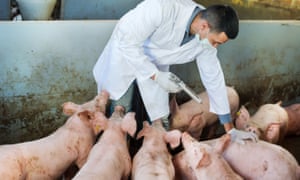Using animals’ own immune systems may provide a way to reduce the overuse of antibiotics in farming, replacing the drugs with cheap farm byproducts and cutting the growing risk of resistance to common medicines, new research has suggested.
Natural antibodies, produced by the immune system without previous infection, in animals and humans, can protect the body against harmful bacteria. They are present in some usually unconsidered farm byproducts, such as the whey left over from milk production, and they could be administered to animals easily in feed.
The research, published in the open access journal Veterinary Research, found that antibodies could provide a protection against immediate infection, and act prophylactically by helping animals’ immune systems to be more resistant over time to potential future threats.
A significant benefit of treating livestock preventatively with antibodies, rather than curing them with antibiotics, would be that harmful bacteria would have less opportunity to improve its antibiotic resistance. The authors, from the University of Utrecht in the Netherlands, found that “innate immune mechanisms are highly relevant, as they offer rapid general ways to, at least partially, protect against infections and enable the build-up of a sufficiently adaptive immune response”.
They found two particularly promising alternatives to antibiotics: immunoglobulins, which can act in the body as defence molecules against infections; and peptides, which help the host system in its defence against pathogens, partly by delaying the establishment of infection. The production of these can be induced in the host animal, or can be used to create vaccines.
However, the authors of the new research warned that antibody treatments, while promising, are still some way from common commercial use. For that to be possible, much more research is needed, both to prove their effectiveness and make them widely available. They called for more work on the area as a matter of urgency, if the global antibiotic crisis is to be averted.
Treatments for livestock account for the majority of antibiotics used around the world, and they are often controversial. Whole herds or flocks are routinely treated when only one or a few animals are infected, even in regions where antibiotic use on animals is closely regulated, such as Europe. In some other regions, including China and other Asian countries, the routine use of antibiotics to promote faster growth of livestock is also widespread.
Physicians are increasingly concerned that the widespread, and sometimes indiscriminate, use of antibiotics in farming is a key cause of the growing resistance to antimicrobial medicines that is leading to an increasing number of diseases becoming untreatable in humans. The World Health Organisation made a plea last year for governments to ban at least the strongest and most important antibiotics, the drugs “of last resort” for human health, for use on animals, but with little response.
If even some commonly used antibiotics could be substituted with antibody-based treatments, it would be a major step forward in reducing antibiotic use around the world. For that to happen, cheap alternatives are essential, as antibiotics are so cheaply available, according to the Utrecht researchers.
Coilin Nunan, scientific adviser to the Alliance to Save Our Antibiotics, said: “Any new treatment which can be shown to be safe and effective for individual sick animals would be welcome, particularly if it helps reduce antibiotic use. But instead of trying to develop alternative forms of mass medication, our priority should be to increase animal health through improved husbandry. Piglets naturally receive antibodies in their mother’s milk and often develop diarrhoea when they are weaned early. What is needed for better piglet health is later weaning rather than adding antibodies to their feed.”



